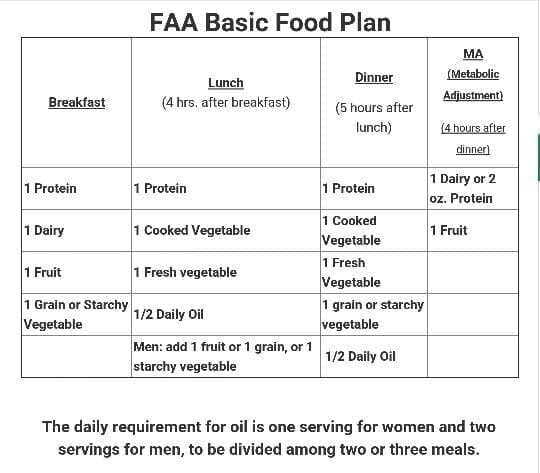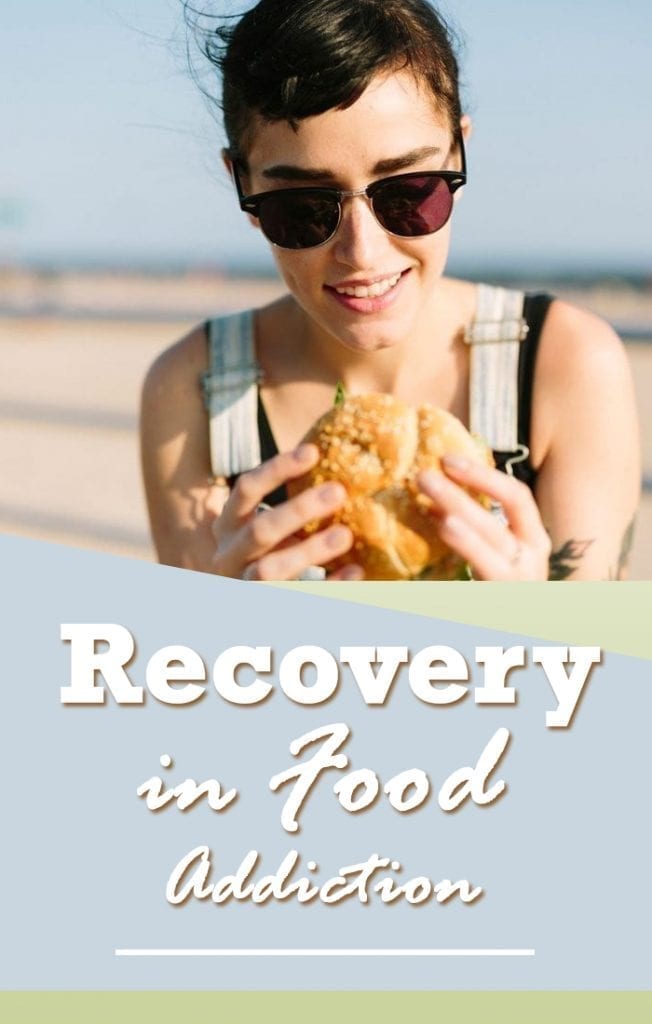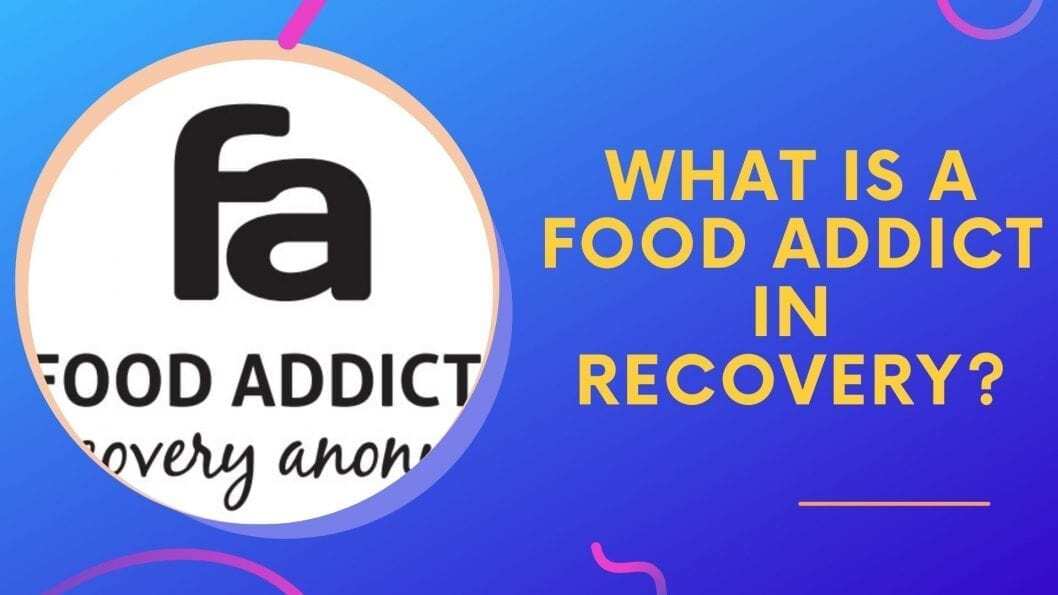Am I a food addict who needs to be in recovery? If you’re asking this question please know you are not alone.
Many people feel that they are addicted to food, and there are many ways that they can try to recover from this situation.
This article will primarily focus on the Food Addicts in Recovery Anonymous group. This group is similar to Overeaters Anonymous, but different in important ways too.
Let’s dive in.
How do you know if you have a food addiction?

Generally speaking, you can use some of the following questions to determine if you have a ‘food addiction’ or not.
(Please note: I am putting the word ‘food addiction’ in quotes because there is some debate about whether a person can really be addicted to food since we need food to live. I’ll discuss this debate quickly down below, and then talk about the group Food Addicts in Recovery Anonymous.)
- Do you obsessively think about weight loss every day?
- Do you count calories in a perfectionistic, ritualistic way?
- Would you say you have problems relating to eating?
- Do you eat large amounts of food in a short amount of time and feel guilty afterwards?
- Do you eat much differently with people than you do alone?
- Are there specific foods cause extreme urges or binge eating episodes?
- Do you purge, use laxatives, or exercise excessively to ‘burn off’ or ‘get rid’ of the calories you just ate?
- Do you find yourself going through one diet plan after another, only to lose weight initially but then to gain the weight back?
- Has your doctor, a friend, or a member of your family expressed concern about your eating habits?
- Do you hide, hoard or secretly eat food and dispose of all evidence?
- Is your health or weight being impaired in a significant way by your eating habits?
- Have you tried therapy or drugs for emotional issues but still are not free from food?
- Are you waiting to live your best life until you lose the weight or are normal around food, but this time never comes?
Answering “yes” to some of these questions can help you determine whether or not you have a so-called ‘food addiction’.
(Please don’t feel embarrassed about answering ‘yes’ either! Down below we’ll discuss how there are many groups around the world, meeting at every time of day, which you can contact via email and get connected to people going through similar struggles. You are not alone!)
Now, about that word, ‘food addiction’ …
Is Food Addiction Real?
For starters, there is some controversy about whether you can truly be addicted to food.
For example, in the DSM-5 you cannot find an official disorder for ‘food addiction’.
(The DSM-5 is the official manual used by the American Psychiatric Association to diagnose mental disorders. It’s the official standard used in insurance and medical billing in the United States.)
There are several reasons why you cannot find food addiction listed in the DSM-5:
- Unlike alcohol or other addictive substances and behaviors, you need food to live. Obviously we all need food – otherwise we would starve to death. Plus, Intuitive Eating and other food philosophies believe that “food addiction” really is just a catch-phrase and that the real problems that people have with eating are caused by underlying deprivation conditions such as trauma or dieting.
- Withdrawal from certain ‘addictive’ foods does not cause death or truly severe withdrawal symptoms. Unlike alcohol and other addictive substances where withdrawal can lead to death and seizures, withdrawal from addictive foods causes intense cravings. While intense cravings can be horrible, this doesn’t compare to what happens with a truly addictive substance.
Why does “Food Addiction” appear real in your brain?

Regardless of whether food addiction is technically real or not, food addiction certainly appears like an addiction.
Why is this?
It turns out that sugary, palatable foods for many people can activate the same reward regions in your brain that get triggered by truly addictive drugs like cocaine and heroin.
These palatable foods include:
- White sugar
- Fatty foods
- Salty foods
When you eat these foods, your brain can release dopamine and other chemicals which produce the feeling of pleasure.
Once the brain associates dopamine with certain foods, a reward pathway is formed and addictive behaviors may start in some individuals.
These dopamine cravings can become so strong that people eat even when not hungry, or lose control over their eating.
Moreover, oftentimes people will start to fear losing control around food and find themselves spending much of their days thinking and fixated on food and feeling anxious about eating.
So the disease of food addiction, whether it is real or not, can seem like an addiction for very real reasons.
It’s highly advisable that if you do show these symptoms, that you contact a meeting group related to recovery from food addiction or a mental health professional who focuses on eating disorders.
With that being said, let’s switch focus and talk about one such meeting group related to recovery from food addiction, Food Addicts in Recovery Anonymous.
Being A Food Addict In Recovery
What does it mean to be a food addict in recovery?
For some people, it means they experienced symptoms of food addiction like binge eating and are now seeking professional help.
For example, my service is primarily working with clients by using an Intuitive Eating and Cognitive Behavioral Therapy approach to dealing with food addiction and binge eating.
If you are working with me or another eating disorder therapist, you might consider yourself a food addict in recovery.
However, being a food addict in recovery can also refer to being a member of the group, Food Addicts In Recovery Anonymous, which is a 12-step group similar to Overeaters Anonymous.
What Is Food Addicts In Recovery Anonymous?
Perhaps the most powerful step you can take to free your life from food addiction is to simply reach out and talk to someone who has walked a mile in your shoes.
One way to do this is to join a group that focuses on this issue.
Food Addicts in Recovery Anonymous, one such group, was started in 1998 by several members of Overeaters Anonymous.
Like Overeaters Anonymous, this program is complete with meetings that may help someone with eating struggles.
This program is very similar to Overeaters Anonymous in that the twelve steps of Alcoholics Anonymous are used as the foundational principle teachings. (Note that I’ll talk about the differences between Food Addicts Recovery Anonymous and Overeaters Anonymous in the next section.)
You can use this link here to find various meetings and to find a meeting that fits your time.
If you are interested in this, please reach out and contact via email one of the meeting groups that provide a meeting space.
In Food Addicts in Recovery Anonymous, food addiction is defined as ‘an illness of the mind, body, and spirit for which there is no cure’.
Because there is ‘no cure’ the treatment approach of abstinence is offered as guidance. Here is an example of standard meal plan provided by this group:

Abstinence in Food Addicts in Recovery Anonymous is similar to the abstinence from alcohol used in Alcoholics Anonymous.
Abstinence is easy to understand but difficult to truly live. It means that you avoid all forms of flour and sugar.
In addition, members of Food Addicts in Recovery Anonymous are encouraged to weigh and measure every meal and food eaten.
(FYI that I highly disagree with this ‘no cure’ approach. I also disagree with the approach of weighing without any emphasis on learning to listen to body signals such as hunger and fullness. But that’s a discussion for a different day. If you would like to learn more about Intuitive Eating, which takes a different approach to this problem)
What is the difference between Overeaters Anonymous and Food Addicts Anonymous?
The difference between Overeaters Anonymous and Food Addicts in Recovery Anonymous, and a similar group known as Food Addicts Anonymous, is simple:
Members of Food Addicts in Recovery Anonymous and Food Addicts Anonymous believe that a speaker in one of their meetings must have 90 days of abstinence from sugar, flour and binge eating episodes.
(I know it sounds confusing to have two groups, Food Addicts Anonymous and Food Addicts In Recovery Anonymous, but these are distinct for slightly different reasons. For now let’s stick with the big difference between these groups and Overeaters Anonymous.)
In contrast, members of Overeaters Anonymous believe that anyone can speak.
So, the ‘big’ difference between these groups isn’t so big after all, at least from my perspective.
In fact, these meeting groups are found throughout the world and I would consider them to be helpful in recovery from food addiction, even if I disagree with some of their fundamental principles.
Finally, let’s discuss one more topic:
How long does it take to break a food addiction?
It depends.
For some people who have a history of dieting, along with parents who had food addiction, it can take much longer to break a food addiction in comparison to someone who merely dieted.
In addition, abuse and other forms of childhood trauma can make breaking a food addiction more difficult, too.
If you include alcohol and other substance addictions that sometimes go hand-in hand with food addiction, then this can further complicate recovery.
Finally, anxiety and depression are oftentimes prevalent as well, so this can make treatment more difficult as well.
So there are a lot of variables.
Plus, there are essentially two different philosophical schools of thoughts:
- Food Addiction is real and not curable: this is the belief of Overeaters Anonymous and other groups as well. Abstinence is the solution.
- Intuitive Eating and other mainstream therapeutic approaches: In these approaches, food addiction seems to be real but is caused by underlying conditions such as trauma or dieting behaviors. If you solve these underlying conditions then the food addiction goes away.
In my experience, it seems like people are drawn to one or the other philosophy.
I don’t want to shame or say one philosophy is better than the other.
Do yourself a service: if food addiction is a real, personal, obsession of yours then try both schools out for yourself! You have to try for yourself and see what works for you!
With that being said, let’s wrap up today’s article.
I realize you may have questions or comments so please be sure to contact me or let me know in the comment section down below!




